YOUR BLOOD CAN HELP
DONATE NOW. DONATE REGULARLY.
Red blood cells carry oxygen to our tissues and organs. Usually these cells are round, flexible and float in our blood vessels easily. Sickle cell disease is an inherited condition where abnormal sticky, rigid red blood cells shaped like sickles or crescents get stuck in blood vessels, preventing normal blood flow.
Normal red blood cells survive for 3 to 4 months, with the body always making new red blood cells to replace the old cells. Sickle cells however only survive about 10 to 20 days, and the body may have trouble keeping up with how fast the cells are being destroyed. This can cause severe pain and swelling in joints, anemia, fatigue and extreme tiredness, jaundice, and an increased chance of infection.
Over time, sickle cell disease can lead to complications such as infections, delayed growth, and episodes of pain called pain crises. Most children who have sickle cell disease are pain-free between crises, but adolescents and adults may also suffer with chronic (ongoing) pain. Over a lifetime, sickle cell disease can harm a patient’s spleen, brain, eyes, lungs, liver, heart, kidneys, penis, joints, bones, and skin.


Isaiah is one of many children who have Sickle Cell Disease. He needs regular transfusions to keep it under control. But there’s not enough African American donors to give him the antigens he needs.
Cascade Regional Blood Services works with MultiCare’s Mary Bridge Children’s Hospital
Cascade Regional Blood Services provides the specific blood products needed for patients at Mary Bridge Children’s Hospital. A dedicated nurse case manager ensures children with sickle cell disease get personalized care and the recommended tests and treatments.
Mary Bridge offers a comprehensive sickle cell program. A dedicated nurse case manager will ensure that your child gets personalized care and the recommended tests and treatments.
Mary Bridge’s sickle cell anemia services include:
- Chronic transfusion therapy for children with complications
- Bone marrow transplant referrals and care coordination with Seattle Children’s Hospital for children with sickle cell disease
- Medication management for Hydrea (hydroxyurea), the only drug currently available to reduce sickle cell crisis
HOW YOUR BLOOD DONATION HELPS PEOPLE WITH SICKLE CELL DISEASE
Blood transfusion is one of the most critical sickle cell treatments.
Blood transfusions can lessen pain for the children and adults who live with sickle cell disease. Some sickle cell disease patients require transfusions as often as monthly—making the need for blood donations constant.
Patients depend on donors who have (or lack) specific blood antigens. Yet not everyone has these special combinations, making it all the more important for those who do to donate blood on a regular basis.
When you donate, your blood is tested for the specific antigens that are important to ensure the blood is compatible with sickle cell patients. If your blood contains those characteristics, Cascade Regional Blood Services will let you know, so you can begin helping sickle cell patients by donating whole blood.
For more information about donating for sickle cell disease patients, call 1-877-24-BLOOD or click the button below to make an appointment.
WHO GETS SICKLE CELL DISEASE?
Most people who have sickle cell disease are of African ancestry—but not exclusively. It’s also common in people of South American ancestry. And it can be found in people who come from southern European, Middle Eastern, and South Asian (Indian) backgrounds.
Roughly 100,000 people in the United States have sickle cell disease, and more than two million have sickle cell trait (meaning they carry only one copy of the relevant gene, compared to those with the disease who have both copies). Those with sickle cell trait rarely have symptoms, but may pass the trait to their children. If both parents have sickle cell trait, there is a chance their children will have the disease.
African Americans are by far the largest group affected by sickle cell. One in thirteen African American babies is born with the trait, and one in 365 is born with the disease.
HOW WOULD I KNOW IF I HAVE SICKLE CELL DISEASE?
All newborn babies are required to be screened for sickle cell disease in every state in the United States, including the District of Columbia and U.S. territories. Because the disease runs in families, couples planning to have children can have genetic testing.
In babies, the first symptom parents may notice is swollen hands and feet—a result of the sickle cells getting stuck in the blood vessels and blocking the blood flow. Because they get stuck, lab tests will usually show the number of red blood cells as lower than normal.
IS THERE A CURE FOR SICKLE CELL DISEASE?
A bone marrow transplant is currently the only cure for sickle cell disease, and only a small number of people who have sickle disease are able to have the transplant.
Sickle cell disease is a lifelong illness. The severity of the disease varies a lot from person to person. There are effective treatments however that can reduce symptoms and prolong life. Early diagnosis and regular medical care prevent complications and contribute to improved well-being.
Providers may recommend transfusion to treat and prevent certain sickle cell disease complications. While some patients may need one-time transfusions to treat acute (emergency) complications or crises, many require regular, ongoing transfusions for treatment. The need for your blood is constant—and if you are eligible, you can donate blood multiple times each year.
WHAT IF I’M READY TO COMMIT TO REGULAR DONATIONS?
You might qualify for our Automated Blood Donation program.
WHERE CAN I GET MORE INFORMATION?
Please read our Frequently Asked Questions, or follow the links below for further resources. Or just call contact one of our donor specialists at 1-877-24-BLOOD.
FURTHER RESOURCES
National Heart Lung and Blood Institute (an agency of the National Institutes of Health)
Northwest Sickle Cell Collaborative The regional medical collaborative (includes Metropolitan Seattle Sickle Cell Task Force, Odessa Brown Children’s Clinic, Seattle Children’s Hospital, Mary Bridge Children’s Hospital, and Sacred Heart Children’s Hospital in Spokane)
Metropolitan Seattle Sickle Cell Taskforce Our local grass roots organization supporting patients in the metro Seattle area
Mary Bridge Children’s Hospital Our local program






